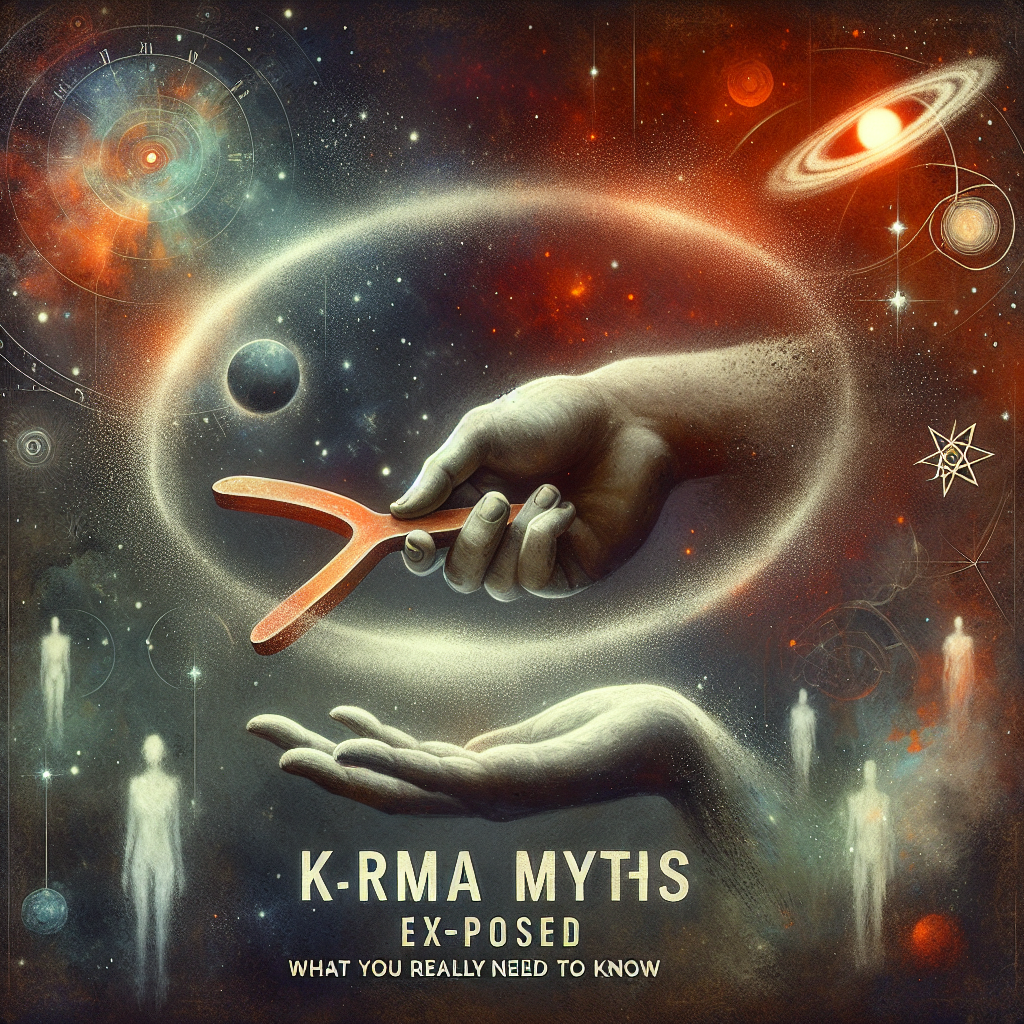Karma, derived from the Sanskrit word "karman," meaning "action" or "deed," is a principle deeply rooted in various Eastern philosophies and religions such as Hinduism, Buddhism, and Jainism. Often, it is misunderstood and simplified into a mere cause-and-effect formula, where good actions lead to good outcomes and bad actions lead to suffering. However, the reality of karma is much more nuanced, drawing on a complex interplay of morality, intention, and the broader context of life.
Understanding Karma: The Basics
At its core, karma is about the moral quality of our actions. It teaches that every action we take—thought, word, or deed—creates a ripple effect that influences our lives and the lives of others. The fundamental tenet of karma is that nothing exists in isolation; every action contributes to a larger tapestry of interconnected experiences.
The Different Types of Karma
Sanchita Karma: This refers to accumulated karma from all past lives. It encompasses the total sum of all actions and their consequences waiting to manifest in this life or future lives.
Prarabdha Karma: This is the portion of karma that is active and influencing your current life. It is the karma you are experiencing now that you cannot change; it reflects the lessons you need to learn in this lifetime.
Kriyamana Karma: Also known as "current karma," this represents the choices we make in the present moment. Unlike prarabdha karma, it is something we have control over, shaping the future of our karma.
- Agarbatti Karma: The term can refer to actions that one performs with the expectation of a result—sometimes leading to complex consequences.
As we delve into popular myths surrounding karma, it’s crucial to unpack misconceptions that cloud its true meaning and significance.
Karma Myths Exposed
Myth 1: Karma is Always Instantaneous
One of the most pervasive misconceptions about karma is the belief that it operates on a timeline that guarantees immediate results. In reality, the consequences of our actions can manifest days, months, or even lifetimes later. Some belief systems advocate for patience and long-term perspective when it comes to understanding karma.
Myth 2: Karma is a Punitive Force
Many people perceive karma as a cosmic police force that punishes wrongdoers and rewards the righteous. This interpretation oversimplifies karma to a system of rewards and punishments. In truth, karma is neutral; it does not "punish" or "reward" but rather reflects the moral quality of our actions. When suffering occurs as a result of negative actions, it is essential to see it as an opportunity for growth and learning rather than mere punishment.
Myth 3: Karma Only Applies to Actions, Not Intentions
While actions are critical, karma does acknowledge the importance of intentions. The moral weight of an action is influenced significantly by why it was performed. For instance, helping someone out of genuine compassion creates positive karma, while doing the same act for selfish reasons or recognition might not bear the same weight.
Myth 4: Karma is Only Concerned with the Individual
Another common myth is that karma only pertains to individual actions and consequences, neglecting the collective impact of choices. The interconnectedness of all beings means that our actions affect not just ourselves but society and the planet as a whole. Transformational karma stories often highlight this interdependence, showcasing how small acts of kindness can produce ripple effects throughout entire communities.
Myth 5: You Can ‘Work Off’ Bad Karma
Many people hold onto the idea that they can ‘work off’ bad karma through good deeds or rituals. While engaging in positive actions can certainly contribute to positive karma and lead to healing, it does not erase negative karma nor should it be viewed as a transactional exchange with the universe. Instead, it’s essential to embrace accountability and learn from past actions to foster genuine change and growth.
Myth 6: Karma is a Fatalistic Concept
Some falsely equate karma with fatalism, believing that our destinies are predetermined and that there’s no room for free will. Although karma does suggest that past actions can influence current circumstances, it equally emphasizes the power of present choices. This duality suggests that while one may bear the consequences of previous actions, they still possess the autonomy to choose differently going forward.
Myth 7: Good Deeds Always Result in Good Outcomes
While this sounds appealing, it’s misleading to think that good actions will always bear fruit in well-being and happiness. Life is inherently complex, and circumstances often play a significant role in how karma unfolds. Good intentions may lead to unexpected consequences, not because of a flaw in morality, but due to the unpredictable nature of life.
What You Really Need to Know About Karma
Understanding karma means embracing a more profound appreciation for the choices we make and their impacts on ourselves and the world around us. It invites us to reflect on our intentions, acknowledge the interconnectedness of life, and cultivate compassion—both for ourselves and others.
Karma teaches us that every moment presents an opportunity for conscious action, enabling us not only to create positive karma but to transform our understanding of ourselves and our experiences. True liberation comes when we recognize our past karmic residues while actively shaping our present and future through mindful actions.
The Importance of Self-Reflection
Self-reflection is an essential aspect of understanding karma. Regularly examining our thoughts, intentions, and actions nurtures personal growth. When we take time to evaluate our lives, we can identify patterns, make amends, and make choices that align with a deeper sense of ethical responsibility.
FAQs
What is karma?
Karma is the principle of cause and effect, where every action, thought, and deed creates a ripple effect that influences one’s life and the lives of others.
Does karma punish people?
Karma is not a punitive force but rather a neutral principle that reflects the moral quality of our actions. It teaches us about accountability and the consequences of our choices.
Can I change my karma?
While past karma may influence your present circumstances, the choices you make today shape your future karma. You always have the power to change your actions and, by extension, your destiny.
Is karma only about individual actions?
No, karma acknowledges the interconnectedness of all beings. Actions affect not just the individual but also society and the environment.
How can I create positive karma?
Creating positive karma involves acting with genuine intention, compassion, and awareness. Engaging in self-reflection and making mindful choices can foster positive outcomes and experiences.
Does karma always result in immediate consequences?
No, karma does not always manifest instantaneously. The consequences of your actions may unfold over time, potentially in this life or future ones.
Can good deeds erase bad karma?
While good deeds can contribute to creating positive karma, they do not simply erase the negative. Acknowledgment, learning, and intentional change are vital for true transformation.
Embracing the complexities of karma can lead to profound understanding and personal growth. Instead of viewing it through a lens of rewards and punishments, consider it as an ongoing journey of learning, connection, and responsibility.
Sure! What kind of prompt are you looking for? It can be for writing, brainstorming ideas, creative projects, or something else! Let me know your preferences, and I’ll be happy to help!, #Karma #Myths #Exposed, #Karma #Myths #Exposed, 1736318200, karma-myths-exposed-what-you-really-need-to-know





